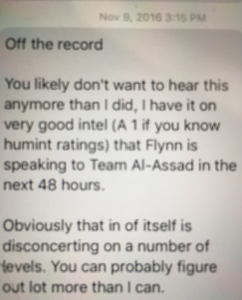Putting a Face (Mine) to the Risks Posed by GOP Games on Mueller Investigation
I’d like to put a human face — my own — to the risk posed by GOP gamesmanship on the Mueller investigation.
Sometime last year, I went to the FBI and provided information on a person whom I had come to believe had played a significant role in the Russian election attack on the US. Since that time, a number of public events have made it clear I was correct.
I never in my life imagined I would share information with the FBI, especially not on someone I had a journalistic relationship with. I did so for many reasons. Some, but not all, of the reasons are:
- I believed he was doing serious harm to innocent people
- I believed (others agreed) that reporting the story at that time would risk doing far more harm than good
- I had concrete evidence he was lying to me and others, including but not limited to other journalists
- I had reason to believe he was testing ways to tamper with my website
- I believed that if the FBI otherwise came to understand what kind of information I had, their likely investigative steps would pose a risk to the privacy of my readers
To protect the investigation, I will not disclose this person’s true identity or the identity and/or role I believe he played in the attack. Nor will I disclose when I went to the FBI. I did so on my own, without subpoena; I did that in an effort to protect people who have spoken to me in confidence and other journalists. Largely because this effort involved a number of last minute trips to other cities, I spent around $6K of my own money traveling to meet with lawyers and for the meeting with the FBI.
I always planned to disclose this when this person’s role was publicly revealed. But I’m doing so now for two reasons. First, I think the public deserves to see the text he sent me at 3:15 PM on November 9, 2016.
The substance of the text — that the Trump team started focusing on Syria right after the election — has been corroborated and tied to their discussions with Russia at least twice since then. Most importantly, in his statement to Congress, Jared Kushner explained his request for a back channel with the Russians by describing an effort to cooperate on Syria.
The Ambassador [Sergei Kislyak] expressed similar sentiments about relations, and then said he especially wanted to address U.S. policy in Syria, and that he wanted to convey information from what he called his “generals.” He said he wanted to provide information that would help inform the new administration. He said the generals could not easily come to the U.S. to convey this information and he asked if there was a secure line in the transition office to conduct a conversation. General Flynn or I explained that there were no such lines. I believed developing a thoughtful approach on Syria was a very high priority given the ongoing humanitarian crisis, and I asked if they had an existing communications channel at his embassy we could use where they would be comfortable transmitting the information they wanted to relay to General Flynn.
Less credibly, in the days after Mike Flynn pled guilty, an inflammatory Brian Ross report was corrected to reveal that “shortly after the election” Trump asked Flynn personally to work with Russia on Syria (Ross left ABC yesterday but as far as I understand the corrected story stands).
Retired Lt. Gen Michael Flynn has promised “full cooperation” in the special counsel’s Russia investigation and, according to a confidant, is prepared to testify that Donald Trump directed him to make contact with the Russians, initially as a way to work together to fight ISIS in Syria.
[snip]
The source said Trump phoned Flynn shortly after the election to explicitly ask him to “serve as point person on Russia,” and to reach out personally to Russian officials to develop strategies to jointly combat ISIS.
The text sent to me matches both those reports — indeed, it makes it clear that “shortly after the election” means just over 14 hours after polls closed. But the text doesn’t come from anyone, like Kushner or Flynn, inside the Trump team. It comes from someone who, I believe, had already done real damage to the United States as part of the Russian attack. That person understood the cooperation with Syria in terms of the US backing Bashar al-Assad, not in terms of fighting ISIS.
I’m making this public now because a David Ignatius report Thursday maps out an imminent deal with Russia and Israel that sounds like what was described to me within hours of the election. This deal appears to be the culmination of an effort that those involved in the Russian attack worked to implement within hours after the election.
The other reason I’m disclosing this now is to put a human face to the danger in which the House Republicans are putting other people who, like me, provided information about the Russian attack on the US to the government.
Several times since I first considered sharing information with the FBI, I’ve asked my attorney to contact the FBI to tell them of what I perceived to be a real threat that arose from sharing that information. One of those times, I let law enforcement officers enter my house without a warrant, without me being present.
My risk isn’t going to go away — indeed, going public like this will surely exacerbate it. That’s to be expected, given the players involved.
But I’m a public figure. If something happens to me — if someone releases stolen information about me or knocks me off tomorrow — everyone will now know why and who likely did it. That affords me a small bit of protection. There are undoubtedly numerous other witnesses who have taken similar risks to share information with the government who aren’t public figures. The Republicans’ ceaseless effort to find out more details about people who’ve shared information with the government puts those people in serious jeopardy.
I’m speaking out because they can’t — and shouldn’t have to.
It infuriates me to observe (and cover) a months-long charade by the House GOP to demand more and more details about those who have shared information with the government, at least some of whom were only trying to prevent real damage to innocent people, all in an attempt to discredit the Mueller investigation. As someone who has worked to rein in dragnets for over a decade, I’m all the more disgusted to see so many lifelong cheerleaders of surveillance pretend to care now.
I only came to be convinced slowly about Russia’s role in the attack and I have been skeptical of the Steele dossier from the day it was published. That said, I obviously do not like Donald Trump — though I’m no Hillary fan, either. But my decision to share information with the FBI had nothing to do with my dislike for Donald Trump. It had to do with the serious damage that someone else I believed to be involved in the Russian attack — someone I had been friendly with — was doing to innocent people, almost all of those people totally uninvolved in American politics.
This investigation is not, primarily, an investigation into Donald Trump. It’s an investigation into people who attacked the United States. It’s time Republicans started acting like that matters.
On Thursday night, I reached out to the Special Counsel’s Office to inquire whether I could post this without damaging the investigation. After sharing the specific language from the passages I felt might pose the biggest concern, last night at 10:15, I was informed they, “take no position” on my posting it.






